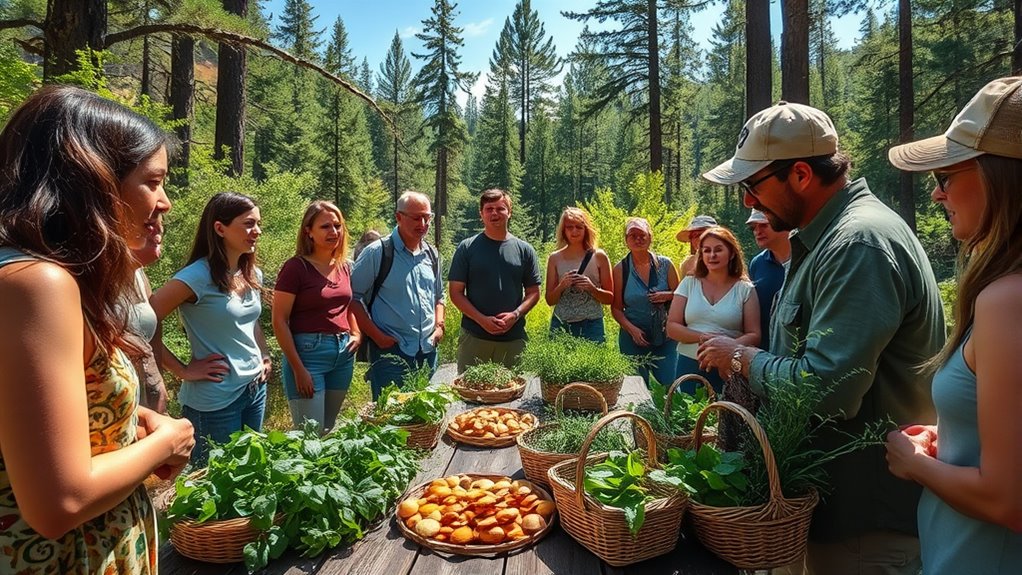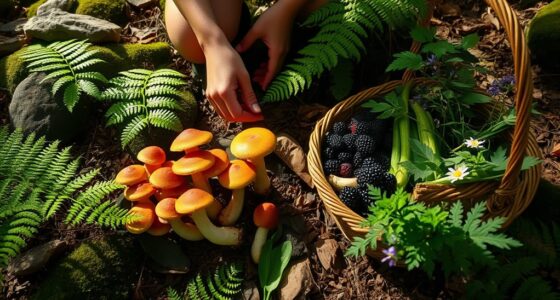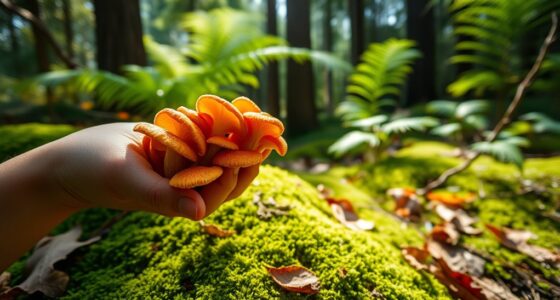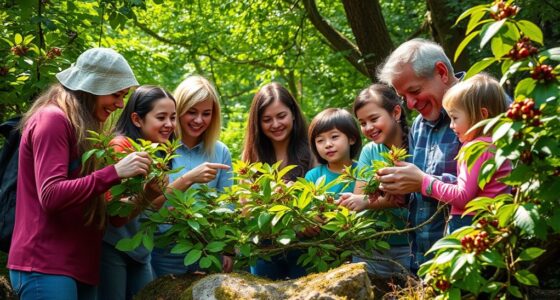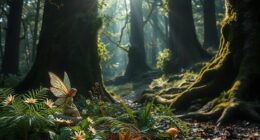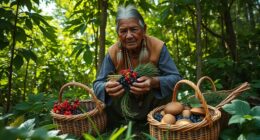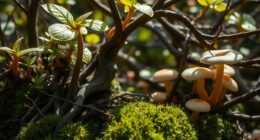Foraging workshops and classes offer in-person and online options to learn how to identify, harvest, and enjoy wild edibles safely and responsibly. You’ll cover topics like plant and mushroom identification, sustainability, and local regulations, often with hands-on experiences or virtual resources. These courses help you build confidence, develop eco-friendly practices, and connect with nature and community. If you’re curious about choosing the right class, there’s more to explore below.
Key Takeaways
- In-person workshops offer hands-on learning in local natural environments, while online courses provide flexible, self-paced education with digital resources.
- Classes cover plant identification, safe harvesting practices, ethics, sustainability, and regional-specific flora and fauna.
- Specialized courses focus on mushrooms, seaweed, wild herbs, and medicinal plants, often aligned with seasonal availability.
- Responsible foraging emphasizes environmental conservation, legal regulations, and minimizing ecological impact during harvesting.
- When choosing a class, consider instructor expertise, curriculum content, class size, reviews, and available virtual or regional options.
Types of Foraging Workshops: In-Person and Online
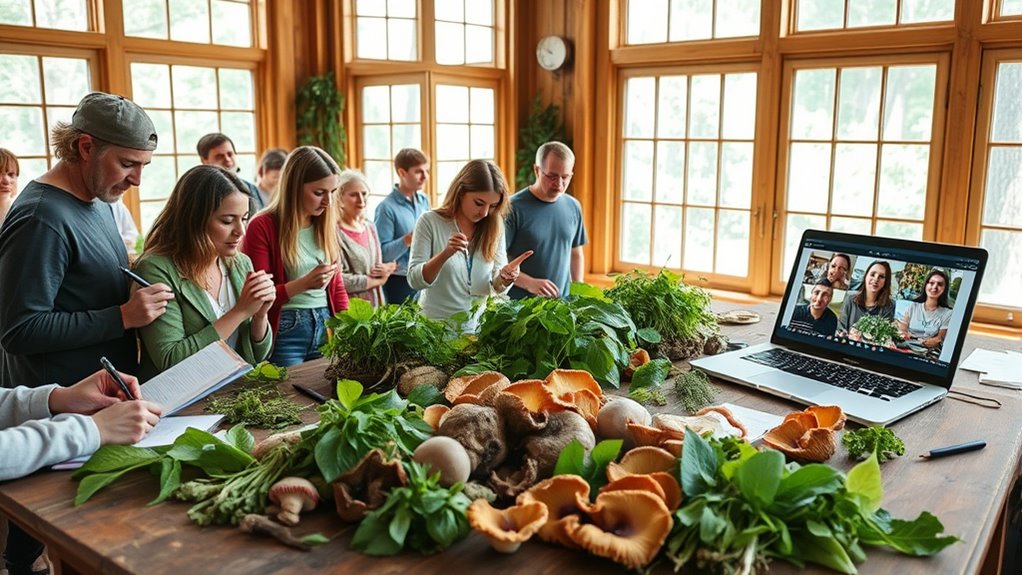
Foraging workshops come in two main formats: in-person and online, each offering unique advantages. In-person workshops give you hands-on experience in natural environments like forests or reserves, allowing you to directly engage with plants and learn from expert instructors. These sessions are ideal if you want immersive, regional-specific knowledge and the chance to harvest and prepare wild edibles firsthand. They also foster community building, so you can connect with others who share your interests. Online courses, on the other hand, provide flexibility and accessibility, letting you participate from anywhere at your own pace. They often include digital materials and live virtual discussions, making learning convenient and cost-effective. Whether you prefer practical fieldwork or virtual convenience, both formats are designed to suit different learning styles and schedules. Additionally, understanding vibrational energy can enhance your ability to manifest successful foraging experiences and deepen your connection with nature. Incorporating proper technique in your foraging practices can significantly improve your safety and success rate. Exploring local foraging resources can also provide valuable guidance and support throughout your learning journey, especially when combined with knowledge of vetted tools and equipment that can aid in gathering wild edibles safely. Moreover, being aware of the risks associated with wild foraging is essential to ensure a safe and sustainable practice.
Key Topics Covered in Foraging Classes
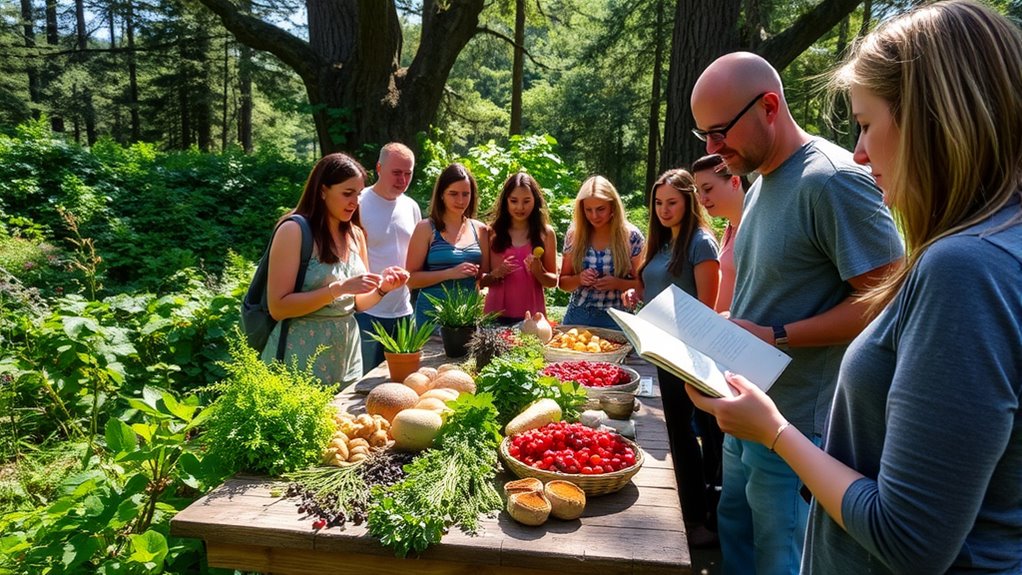
Understanding the key topics covered in foraging classes is essential to developing safe and effective wild edible collection skills. You’ll learn how to identify poisonous plants and avoid dangerous look-alikes, ensuring your safety. Recognizing common plant toxins is crucial for avoiding poisoning risks during foraging activities. Proper harvesting techniques will be emphasized to protect both plants and the environment, promoting sustainability. You’ll also explore handling allergies and sensitivities, so you can recognize and respond to potential reactions. Environmental impact strategies will teach you how to minimize your footprint while foraging responsibly. Additionally, classes cover legal and ethical guidelines, helping you understand your rights and responsibilities. These topics build a solid foundation in botany, mushroom identification, and practical techniques, equipping you with the knowledge needed to forage confidently and sustainably, all while respecting nature’s delicate balance. Focusing on foraging range and habitat considerations can improve your efficiency and help you choose sustainable harvesting sites. Developing an understanding of wild edible plant diversity will further enhance your foraging success and safety. Gaining knowledge about plant ecology can provide deeper insights into ecosystem health and plant interactions, enriching your foraging experience. Learning about local regulations is also vital to ensure compliance and promote responsible foraging practices.
Benefits of Participating in Hands-On Foraging Sessions
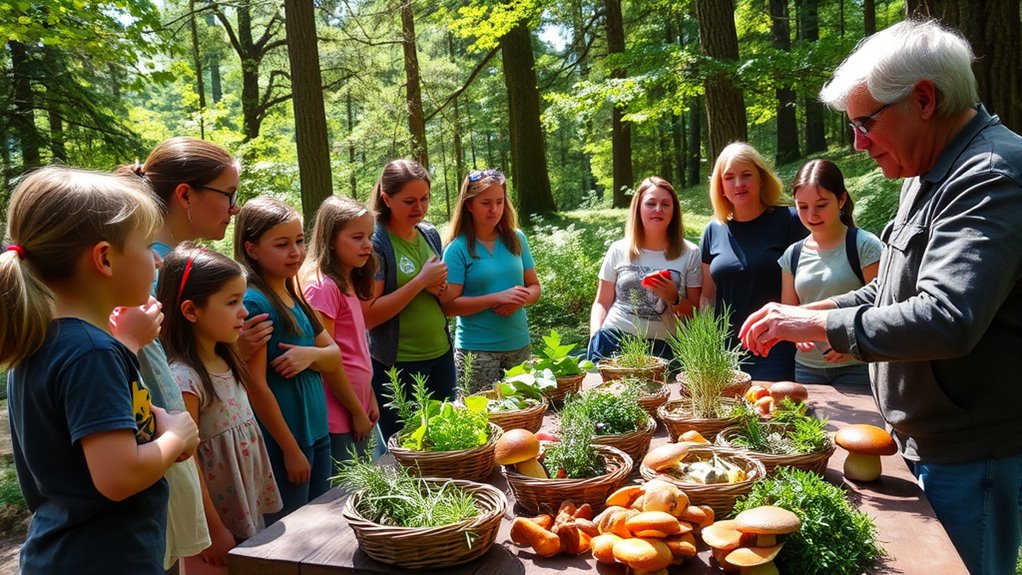
Participating in hands-on foraging sessions offers numerous benefits that go beyond simply collecting wild foods. You’ll reduce stress by immersing yourself in natural environments, which calms the mind. It also promotes physical activity, helping improve your overall health and fitness. Incorporating sustainable foraging methods can ensure that you harvest responsibly and preserve the environment for future generations. Consuming wild foods provides essential nutrients and vitamins often missing from processed diets. These sessions deepen your connection with nature, fostering appreciation and respect for the environment. They encourage mindfulness, keeping you present during each step. Additionally, understanding cryptocurrency regulations can enhance your confidence in managing investments like Bitcoin within retirement accounts. Beyond health, you gain cultural knowledge about traditional food gathering practices and learn sustainable foraging methods. The experience boosts your confidence and self-sufficiency as you identify plants and gather ingredients independently. This practical knowledge can also help you avoid spoiled lemon juice and other spoiled ingredients, ensuring your foraged foods are safe to eat. Plus, it’s a great way to connect with like-minded individuals and expand your culinary skills using wild ingredients. Spiritual energy can also be heightened through mindful foraging, enhancing your overall sense of well-being during these experiences. Exploring nutrient-rich ingredients can further enrich your foraging journey and dietary diversity.
Specialized Foraging Courses: Mushrooms, Edible Plants, and More
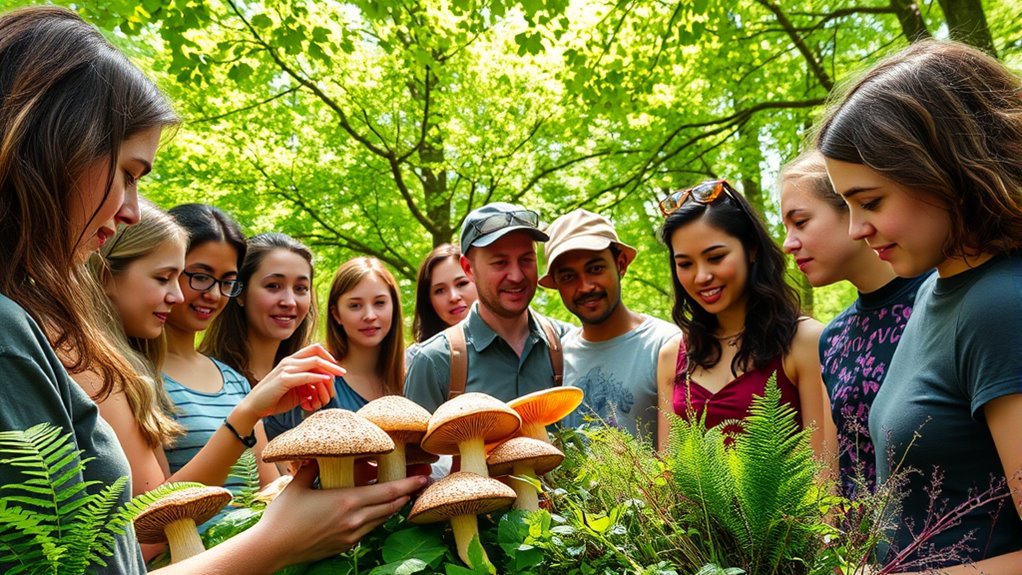
Specialized foraging courses explore the details of identifying and harvesting specific wild foods, such as mushrooms, edible plants, seaweed, and herbs.
In mushroom courses, you learn to recognize both edible and poisonous varieties, explore habitats like forests and grasslands, and practice sustainable harvesting. Safety is a key focus to prevent misidentification and poisoning, while culinary skills are often integrated through cooking classes and preservation tips. Incorporating seasonal availability can enhance your understanding of when certain mushrooms are in peak season and most abundant, ensuring optimal foraging times. Staying informed about payment processing trends can also help you access up-to-date resources and tools for safe and responsible foraging. Developing a growth mindset can encourage continuous learning and improvement in your foraging skills.
Edible plant courses teach you to identify wild herbs and greens, understand seasonal availability, and incorporate them into meals.
Seaweed courses guide you in identifying different types, exploring tidal zones, and harvesting sustainably without damaging marine ecosystems.
Wild herb classes cover plant identification, culinary uses, medicinal properties, and conservation, ensuring you forage responsibly.
Ethical Principles and Legal Guidelines for Foragers
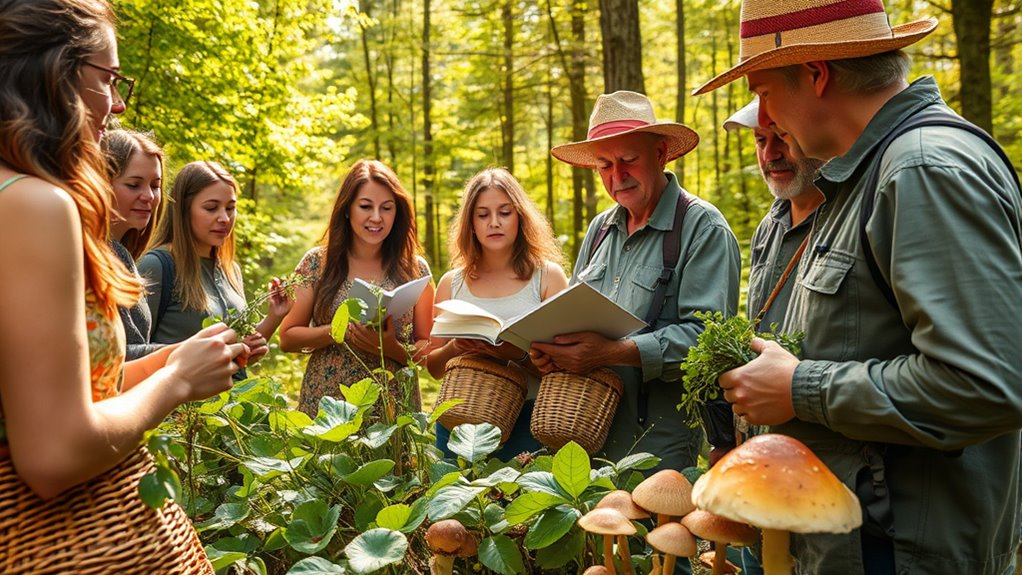
As you expand your foraging skills through specialized courses, it’s important to also consider the ethical principles and legal guidelines that guarantee responsible harvesting. Educate yourself thoroughly about the plants you gather, practicing restraint to ensure sustainability. Understand how your foraging affects the environment and aim to give back to nature through reciprocity. Incorporating digital literacy programs can also help you stay informed about legal updates and safety practices related to foraging.
Always seek permission before foraging on private land and respect protected areas and endangered species. Familiarize yourself with local, national, and international laws, and follow regulations such as the rule of thirds and minimal impact harvesting. Engage with communities and experts to promote ethical practices. Being aware of Cultural and Regional Breakfasts can also help you identify edible plants used in various cuisines, enriching your knowledge and respect for local traditions.
Staying informed about protected species lists and community agreements helps you forage responsibly while respecting legal boundaries and environmental health. Additionally, understanding Forage Sustainability is essential for maintaining healthy ecosystems and ensuring that plant populations remain viable for future generations. Incorporating ethical foraging practices into your routine supports conservation efforts and helps preserve natural habitats for wildlife and plant diversity.
Furthermore, staying updated on Cybersecurity issues related to digital tools used in foraging, such as GPS apps or online databases, can help protect your personal information and ensure safe use of technology during your activities.
Educational Tools and Resources Used in Foraging Courses
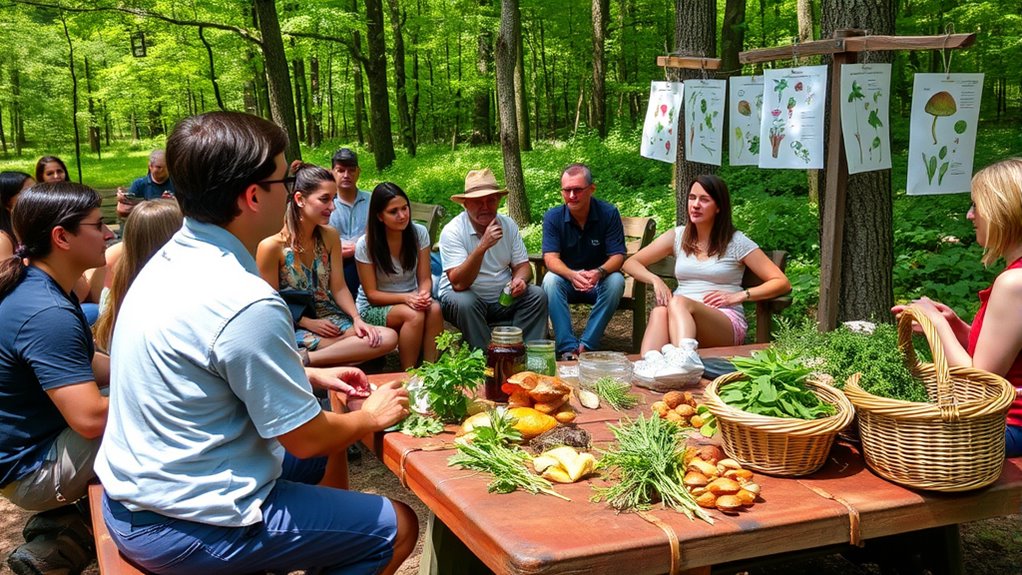
Have you ever wondered how foraging courses equip you with the skills and knowledge needed to identify and harvest wild plants safely? They use a variety of educational tools to do this. Online courses feature videos and reading materials that teach you about edible and medicinal plants. Pocket guides provide quick-reference identification and record-keeping during excursions. Hands-on workshops teach safety, tools, and techniques in natural settings. Educational tools such as sample plant specimens and identification keys help reinforce learning. Incorporating accurate identification methods can further enhance the safety and effectiveness of foraging practices. Using detailed plant identification resources ensures you can distinguish safe plants from potentially toxic ones. Exclusive content offers additional insights not available elsewhere. These resources work together to build your confidence and competence in foraging. By combining digital materials, practical tools, and interactive sessions, courses ensure you’re well-prepared to forage responsibly and effectively.
Regional Focus and Seasonal Considerations in Workshops

Ever wonder how foraging workshops tailor their lessons to fit specific regions and seasons? They focus on local ecosystems, highlighting unique species and available resources. For example, classes in Marin and Sonoma counties often center on mushroom hunting, leveraging the area’s rich fungal diversity.
Workshops like Insta Forager cover broader California activities, including crabbing and woodland foraging. Seasonal considerations are key—winter classes target winter mushrooms, while spring workshops focus on morels.
In summer and fall, foragers explore a variety of plants and fungi, with techniques adapted to seasonal changes and weather conditions. Local experts, like Patrick Hamilton from ForageSF, share region-specific knowledge, helping you understand local flora and fauna.
This regional and seasonal focus enriches your experience and promotes sustainable, context-aware foraging practices.
Tips for Choosing the Right Foraging Class for You

Choosing the right foraging class depends on several key factors. First, consider the instructor’s experience—look for someone with a strong background in foraging and teaching. Make certain the curriculum covers essential topics like plant identification, ethical harvesting, and safety precautions.
Practical, hands-on activities and ample Q&A time enhance learning. Next, evaluate the learning environment: smaller classes often mean more personalized attention, and access to quality resources and diverse field locations improves the experience.
Cost is also important; compare the price to the depth of content and any certification offered. Finally, check reviews, instructor reputation, and class accessibility, including virtual options.
A well-chosen workshop aligns with your skill level, schedule, and learning preferences, making your foraging journey both enjoyable and safe.
Frequently Asked Questions
How Do I Ensure the Safety of Wild Foraged Foods?
To guarantee the safety of wild foraged foods, you should always properly identify plants before consuming them, consulting reliable guides or experts.
Avoid lookalikes and start with small portions to check for reactions.
Thoroughly wash and cook foods when necessary, and stay away from contaminated areas like roadsides, industrial sites, or places with visible pollution.
Respect conservation laws and only harvest sustainably to protect both yourself and the environment.
Are Foraging Workshops Suitable for Children or Beginners?
Think of foraging workshops as a gateway to nature’s treasure chest, perfect for beginners and children alike. You’ll find that many are designed with safety, hands-on activities, and expert guidance, making the experience engaging and educational.
These workshops foster curiosity, teach essential skills, and help build a deeper connection with nature. With structured lessons and resources, you can confidently introduce newcomers to foraging in a fun, safe environment.
What Equipment or Gear Is Recommended for In-Person Foraging Classes?
When attending in-person foraging classes, you should bring essential gear like a sturdy backpack for your supplies, a field guide for plant identification, and a knife for harvesting.
Wear comfortable, weather-appropriate clothing, including waterproof gear if needed.
Don’t forget gloves to protect your hands, insect repellent, and a water bottle to stay hydrated.
A camera can help document your finds, and a notebook is useful for notes.
How Do I Verify the Credibility of Online Foraging Courses?
Wondering if that online foraging course is trustworthy? First, check the instructor’s credentials and reputation in herbalism or foraging communities.
Look for reviews and testimonials from past students—these reveal real experiences.
Verify if the course is accredited or offers a recognized certificate.
Make certain it covers safety, legal, and environmental practices, and see if it provides thorough materials and access to instructors.
A credible course will tick all these boxes.
Can I Forage Legally on Public Lands in My Area?
You wonder if you can forage legally on public lands in your area. To find out, research local, state, and federal regulations, as rules vary widely.
Check if permits are required or if certain areas prohibit foraging altogether. Contact land management agencies or visit their websites for specific guidelines.
Following these rules helps you avoid legal penalties and guarantees your foraging is sustainable and respectful of the environment.
Conclusion
Think of choosing a foraging workshop like planting a seed—you’ll nurture your knowledge and skills over time. Whether you pick an online class or an in-person session, each experience helps you grow into a confident forager. By exploring different topics and respecting ethical guidelines, you’ll cultivate a deeper connection to nature’s pantry. With patience and curiosity, your foraging journey will blossom into a rewarding adventure, enriching both your mind and plate.

